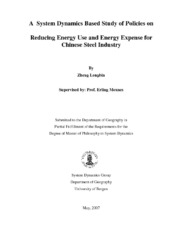A System Dynamics Based Study of Policies on Reducing Energy Use and Energy Expense for Chinese Steel Industry
Master thesis

View/
Date
2007Metadata
Show full item recordCollections
- Department of Geography [627]
Abstract
Chinese steel industry is one of the energy intensive industries in China. Coal and electricityare the two main energy sources for steel making. Steel industry in China is experiencing itstransition period because of economy transition during the industrialization period. Steeldemand has increased significantly in recent years, which correspondingly enlarges theenergy demand. On the other hand, energy prices of coal and electricity have been increasingdramatically since 1980 because of the macro-control from the government. Large energydemand leads to high energy consumption and high energy price raises the energy expense ofsteel making.Motivated by the need to reduce energy use and energy expense, a System Dynamics basedmodel is built to investigate policies in order to help Chinese steel industry ease energyproblems during its transition period. The model helps to foster learning about a dynamicallycomplex system, and thus contributes to a better understanding on the effectiveness, validityof energy policies. Results show that most of the investigated policy options are cost-effective.However, implementation remains a critical issue, the viability of energy tax and R&Dsubsidy is still questionable in the real world. Developing the technology of recyclingscrapped steel is found to be useful in limiting carbon emission with comparatively easyimplementation.
Publisher
The University of BergenCopyright
The authorCopyright the author. All rights reserved